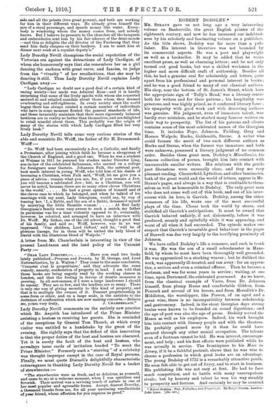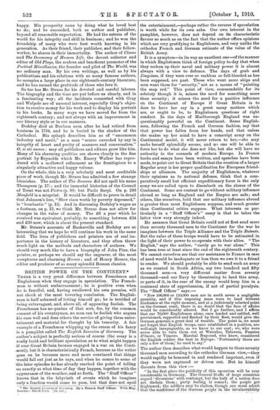• • • ROBERT DODSLEY.*
Ma. STRAUB gave us not long ago a very interesting volume on Baskerville, the great English printer of the eighteenth century, and now he has increased our indebted- ness by his scholarly and fascinating volume on a publisher. As the title shows, Dodsley was far more than a pub- lisher. His interest in literature was not bounded by its commercial aspects. He was a poet and playwright as well as a bookseller. It may be added that he wrote excellent prose, as well as charming letters ; and he not only turned out good books, but was a skilled workman in the higher and more difficult craft of authorship. Besides all this, he had a genuine zeal for scholarship and letters, quite apart from his professional and personal interest in hooka; and he was a good friend to many of our classical authors. His shop, near the bottom of St. James's Street, which bore the appropriate sign of ' Tully's Head,' was a literary centre both for writers and for their patrons ; his hospitality was generous, and was highly prized, as it conferred literary fame ; his sympathy with good work and with deserving authors was genuine. His judgment, even of immature talent, was hardly ever mistaken, and he started many famous writers on their way to prosperity. The list of his patrons and clients contains some of the most celebrated names of the Georgian time. It includes Pope, Johnson, Fielding, Gray and Horace Walpole, Burke, Goldsmith, Sterne. A writer who could foresee the merit of two such different authors as Burke and Sterne, when the former was immature and both were unknown, possessed a literary judgment of no common order. Besides these great men, Dodsley's Miscellanies, his famous collection of poems, brought him into contact with innumerable smaller writers. His relations with the gentle poet Shenstone were unusually close, and they are very pleasant reading. Chesterfield, Lyttelton, and other luminaries, both of the great world and the world of letters, appear in Mr. Straus's pages, and always in a way that is creditable to them- selves as well as honourable to Dodsley. The only great man who does not come well out of this book, and out of his inter- course with its hero, is Garrick. Dodsley, among the other- romances of his life, wrote one of the most successful plays of the time. Cleone took the world by storm, and stultified all Garrick's anticipations. It must be owned that Garrick behaved unfairly, if not . dishonestly, before it was produced, meanly and spitefully while it was appearing, and worst of all when it had succeeded. The episode makes one suspect that Garrick's invariable good behaviour in the pages. of Boswell was due very largely to the terrifying proximity or Johnson.
We have called Dodsley's life a romance, and such in truth it was. He was the son of a small schoolmaster in Mans- field, by whom he must have been thoroughly well grounded. He was apprenticed to a stocking weaver ; but he disliked the work, was apparently ill-treated, and ran away : for an appren- tice, a serious and even a criminal offence. Then he became a footman, and was for some years in service ; waiting, at one time, upon Darteneuf, the celebrated gourmand. As we know, from the classical example of Varro, from Dr. Johnson himself, from plump Hume and comfortable Gibbon, from Peacock and several of his heroes, and from Meredith's Dr._ Middleton, the worshipper, like Porson, of an aged and a
great wine, there is no incompatibility between scholarship and gastronomy. Indeed, in the stout Georgian days strong
brains were known to be founded on sound digestions ; and
the age of port was also the age of prose. Dodsley served the Muses as well as his employers. Indeed, his work brought him into contact with literary people and with the theatres.
He probably gained more by it than he could have secured through• any other menial occupation. The talents
even of a footman cannot be hid. He won interest, encourage- ment, and help ; and his first efforts were published while he was actually in service. The frontispiece to his Muse in Livery, if it be a faithful portrait, shows that he was wise to
choose a profession in which good looks are an advantage. The young Dodsley of 1732 is a remarkably attractive youth. He soon felt able to get out of livery, and to start in business.
His publishing life was not easy at first. He had to face much competition, and to battle with many unscrupulous
rivals; but by honesty and talent he won his way steadily to prosperity and fortune. And certainly he may be counted
• Robert Dadolay: Poet, P.iblishsr, and Playwri,t4t. By Ralph Straus. London,.
John Lane. [21a. net.3
happy. His prosperity came by doing what he loved best to do; and he succeeded, both as author and publisher, beyond all reasonable expectation. He had the esteem of the world for his integrity and skill in business ; and he won the friendship of many who were best worth knowing in his generation. As their friend, their publisher, and their fellow- worker, he shares in their immortality. The author of Cleone and The Oeconomy of Human Life, the devout collector and editor of Old Plays, the zealous and beneficent promoter of the Poetical Miscellanies, the founder and pilot of The World, was am ordinary man. By his own writings, as well as by his publications and his relations with so many famous authors, he occupies a large place in our eighteenth-century literature, and he has earned the gratitude of those who love it.
So too has Mr. Straus for his devoted and careful labours. The biography and the time are put before us clearly, and in a fascinating way ; all the incidents connected with Gray and Walpole are of unusual interest, especially Gray's objec- tion to receive money for his work and to display his portrait in his books. In many ways we have moved far from the eighteenth century; and not always with an improvement in 'our literary style or in our manners.
Dodsley died at Durham soon after he had retired from -business in 1764, and he is buried in the shadow of the Cathedral. His epitaph describes him as of "uncommon 'industry and merit," as a man "scarce exceeded by any in 'integrity of heart and purity of manners and conversation." 0, si sic omnes : may all, publishers and editors grow like him. Many of his charming qualities are shown clearly in the fine portrait by Reynolds which Mr. Emery Walker has repro- duced with a mellowed refinement as the frontispiece to a -singularly attractive and happy volume.
'On the whole, this is a very scholarly and most creditable piece of work, though Mr. Straus has admitted a few strange blemishes. The author of The Seasons did not spell his name Thompson (p. 17); and the immortal historian of the Council of Trent was not Pietra (p. 88) but Paolo Sarpi. On p. 293 Manfteld is a misprint. It would be difficult to prove in detail that Johnson's line, " Slow rises worth by poverty depressed," is " bombastic " (p. 13). And in discussing Dodsley's wages as a footman, on p. 13, we think Mr. Straus does not allow for changes in the value of money. The £6 a year which he received was equivalent, probably, to something between £24 and £30 now, which is about the present standard.
Mr. Straus's accounts of Baskerville and Dodsley are so interesting that we hope he will continue his work in the same field. The lives- of publishers and printers are of real im- portance in the history of literature, and they often throw -much light on the methods and characters of authors. We .should very much like to have a biography of John Pine, the printer, or perhaps we should say the engraver, of the most sumptuous and charming Horace ; and of Henry Homer, the editor and producer of so many splendid Roman classics.



























































 Previous page
Previous page